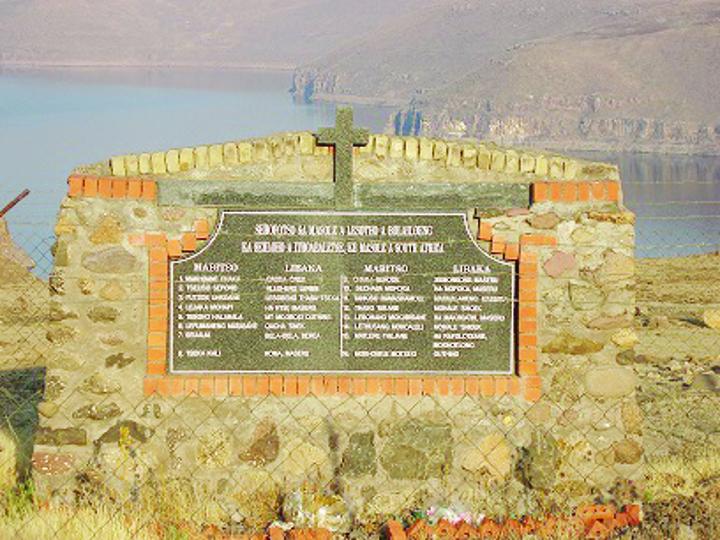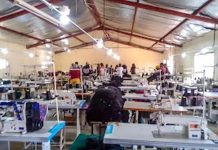Africa-Press – Lesotho. Survivors of Lesotho Dams (SOLD), a local pressure group which advocates for the rights of communities displaced by dam constructions, wants South Africa to compensate Lesotho for the 17 soldiers its troops massacred at Katse Dam in September 1998.
The soldiers were killed by South African paratroopers in helicopter gunships attack targeting the Katse Military Barracks when South Africa invaded Lesotho to quell a military rebellion.
According to reports, a platoon comprising 44 soldiers from the Bloemfontein-based Parachute Brigade besieged the barracks immediately while the rest of the SA intervention force headed into Maseru, on September 22, 1998.
Observers said it appeared the South African National Defence Force (SANDF) paratroopers targeted Katse for its strategic value to South Africa. Katse Dam is the first dam built as part of the multibillion-maloti Lesotho Highlands Water Project (LHWP) – a product of the 1986 Treaty between the governments of Lesotho and South Africa.
A concrete arch dam on the Malibamatšo River in Leribe, Katse Dam is Africa’s second largest double-curvature arch dam and is a transfer reservoir for the whole highlands water project.
“Lesotho soldiers killed in 1998 must be compensated by the Republic of South Africa because they were legally protecting the dam facility as is stipulated in the Treaty,” SOLD said in its document titled, The Lesotho Highlands Water Project Review.
SOLD is an ecumenical, non-profit making and non-governmental organisation that works for justice, good governance, and inclusiveness and participation in decisions that affect communities affected by dams and other large infrastructure developments in Lesotho.
It also wants the 1986 treaty to be overhauled. “The government of Lesotho has made a call that the Lesotho Highlands Water Project Treaty be reviewed.
The call is in line with article 18 of the Treaty,” it noted in its document. “SOLD agrees that the review of the Lesotho Highlands Water Project Treaty of 1986 is long overdue,” it also said.
Masilo Phakoe, Lesotho Highlands Development Authority (LHDA)’s public relations manager, would not be drawn to comment on the massacre but told Public Eye yesterday that the question of the review of the treaty was the remit of the governments of Lesotho and South Africa.
Masilo, however, advised that it should be noted that over the years the treaty had been reviewed several times “hence the current six protocols and the Phase II Agreement”.
“Both the Treaty and the Phase II Agreement include specific articles to ensure that the implementation of the Project will benefit the people in Lesotho and South Africa, including Project affected communities,” he said.
“For example, Article 10 covers the preferential procurement of services and goods.
Preference will be given to suppliers of goods and services including consultants and contractors in Lesotho, South Africa, SADC member states and then internationally in that order,” he added.
Phakoe further explained that the Phase II agreement also indicates that the procurement processes should foster competitiveness, transparency, cost effectiveness and quality.
“In particular”, he said, “the Agreement provides that the consultants and contractors registered in Lesotho and South Africa shall equally share the monetary value of advance infrastructure works”.
Public Eye
reported last month that the South African parliament’s portfolio committee on human settlement, water and sanitation which was in the country earlier in May, and Lesotho’s natural resources parliamentary cluster want the treaty to be reviewed in its entirety.
Some observers have argued that Lesotho got a raw deal when it signed the treaty. But former deputy prime minister, Monyane Moleleki, told Public Eye in an exclusive interview last month that people who were pushing the narrative that Lesotho got a raw deal wanted to derive impossible concessions from the project.
Moleleki said a review of the treaty was unnecessary. He has been the longest serving minister of natural resources and water in Lesotho after the 1993 elections.
“I worked with that treaty for a long time and it is one of the fairly good agreements we have. It is unnecessary to review it in its entirety and I will not be part of such a review,” he said.
Through LHWP, Lesotho transfers water from its highlands to the industrial centre of South Africa, Gauteng via the Vaal River System. Phase I was split into Phases IA and IB, construction of Katse Dam and Mohale Dam respectively, and was completed in 2003.
Phase II involves construction of the Polihali Dam in Mokhotlong, water transfer tunnel Polihali to Katse Reservoir the associated access roads, bridges and telecommunications infrastructure.
When complete, Phase II will increase the current water supply rate of 780-million cubic metres a year incrementally to more than 1,270 million cubic metres a year. The project is implemented by the LHDA. In its document, SOLD stated that it had been holding public gathering in areas around Polihali Dam.
The document read in part: “The affected communities were consulted by the LHDA on the period of compensation; 95 percent of the consulted communities said they wanted compensation for lifetime not for 50 years as stipulated by the LHDA Compensation Policy.
”
SOLD also stated in its document that according to the LHDA feasibility study report, communities suggested a number of years with regard to compensation period. It said a few said 50 years, 70 years, and 99 years, “while the majority said they wanted compensation for a lifetime”.
“What is surprising though, is despite what communities suggested, the LHDA has still stuck with 50 years, and it is not clear what the basis for this compensation period is,” it said.
“In short, LHDA has not incorporated into Phase II Compensation Policy the aspirations of the people.
The question that may be asked is, why did the LHDA finance a feasibility study whose results it rejected?” it added. It claimed that the Polihali communities reject the 50-year period for compensation.
“Through a number of consultations, communities want the LHDA to review the decision on the compensation period because this Compensation Policy has no legitimacy; and according to policy discourse, this is not how policies are developed and are formulated,” it said.
“SOLD has embarked on a course for advocacy for justice in the Polihali area, and have been calling for a review of the entire LHWP Treaty. If communities affected by the LHWP are to benefit in this great water project, this treaty has to be overhauled,” it added.
Phakoe yesterday said during the extensive consultations with communities when the Phase II Compensation Policy was being developed, the communities requested that in addition to compensation being paid as once-off lump sum in cash, provision should be made for the option of compensation to be paid over a number of years.
“As they reasoned, lump sum payments may be quickly used up leaving the affected households wanting,” Phakoe said.
He indicated that to accommodate community concerns, the LHDA retained the option of payment in instalments (Annual Cash Payments–ACP) with the compensation entitlement being paid over a maximum of 50 years.
The value of the compensation entitlement, he said, based on the size of the affected asset and the compensation rate for that particular asset class remained the same whether compensation was paid as a once-off lump sum payment or in instalments over time.
“Affected households are at liberty to choose the payment option that suits their needs i. e.
, a once-off lump sum payment; payment in instalments over a period of up to 50 years; or, payment in kind in the form of grain and pulses. This does not change the amount of compensation due; it is a cash flow control at the request of the household,” he said.
He indicated it was also important to underscore that, in addition to compensation, the LHWP will concurrently support affected communities through the Livelihoods Improvement Programme which will provide a number of alternative means of livelihoods to the affected households and communities. He said: “Hence, compensation for the value of affected assets should not be confused with the maintenance of livelihood.”
For More News And Analysis About Lesotho Follow Africa-Press






